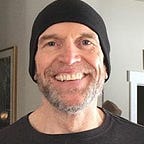Who Controls the World?
One fine afternoon autumn day in Cincinnati I watched transfixed as a gigantic flock of migratory birds swarmed over the woods across the street. I didn’t know it then, but I was watching a “complex, self-organizing system” in action. Schools of fish, ant colonies, human brains… and even the financial industry… all exhibit this behavior. And so does “the economy.”
James B. Glattfelder holds a Ph.D. in complex systems from the Swiss Federal Institute of Technology. He began as a physicist, became a researcher at a Swiss hedge fund. and now does quantitative research at Olsen Ltd in Zurich, a foreign exchange investment manager. He begins his TED Talk with two quotes about the Great Recession of 2007–2008:
“When the crisis came, the serious limitations of existing economic and financial models immediately became apparent.”
“There is also a strong belief, which I share, that bad or over simplistic and overconfident economics helped create the crisis.”
Then he tells us where they came from:
“You’ve probably all heard of similar criticism coming from people who are skeptical of capitalism. But this is different. This is coming from the heart of finance. The first quote is from Jean-Claude Trichet when he was governor of the European Central Bank. The second quote is from the head of the UK Financial Services Authority. Are these people implying that we don’t understand the economic systems that drive our modern societies?”
That’s a rhetorical question, of course: yes they are, and no we don’t. As a result, nobody saw the Great Recession coming, with its layoffs carnage and near-collapse of the global economy, or its “too big to fail” bailouts and generous bonuses paid to its key players.
Glattfelder tackles what that was about, from a complex systems perspective. First, he dismisses two approaches we’ve already seen discredited:
Ideologies: “I really hope that this complexity perspective allows for some common ground to be found. It would be really great if it has the power to help end the gridlock created by conflicting ideas, which appears to be paralyzing our globalized world. Ideas relating to finance, economics, politics, society, are very often tainted by people’s personal ideologies. Reality is so complex, we need to move away from dogma.”
Mathematics: “You can think of physics as follows. You take a chunk of reality you want to understand and you translate it into mathematics. You encode it into equations. Then, predictions can be made and tested. But despite the success, physics has its limits. Complex systems are very hard to map into mathematical equations, so the usual physics approach doesn’t really work here”
Then he lays out a couple key features of complex, self-organizing systems:
“It turns out that what looks like complex behavior from the outside is actually the result of a few simple rules of interaction. This means you can forget about the equations and just start to understand the system by looking at the interactions.
“And it gets even better, because most complex systems have this amazing property called emergence. This means that the system as a whole suddenly starts to show a behavior which cannot be understood or predicted by looking at the components. The whole is literally more than the sum of its parts.”
Applying this to the financial industry, he describes how his firm studied the Great Recession by analyzing a database of controlling shareholder interests in 43,000 transnational corporations (TNC’s). That analysis netted over 600,000 “nodes” of ownership, and over a million connections among them. Then came the revelation:
“It turns out that the 737 top shareholders have the potential to collectively control 80 percent of the TNCs’ value. Now remember, we started out with 600,000 nodes, so these 737 top players make up a bit more than 0.1 percent. They’re mostly financial institutions in the US and the UK. And it gets even more extreme. There are 146 top players in the core, and they together have the potential to collectively control 40 percent of the TNCs’ value.”
737 or 146 shareholders — “mostly financial institutions in the U.S. and the U.K.” — had the power to control 80% or 40% of the value of 43,000 multinational corporations. And those few hundreds — for their own accounts and through the entities they controlled — bought securitized sub-prime mortgages until the market imploded and nearly brought down the global economy valued in the tens of trillions dollars — giving a whole new meaning to the concept of financial leverage. In what might be the economic understatement of the 21st Century, Glattfelder concludes:
“This high level of concentrated ownership means these elite owners possess an enormous amount of leverage over financial risk worldwide. The high degree of control you saw is very extreme by any standard. The high degree of interconnectivity of the top players in the core could pose a significant systemic risk to the global economy.”
It took a lot of brute number-crunching computer power and some slick machine intelligence to generate all of that, but in the end there’s an innate simplicity to it all. He concludes:
“[The TNC network of ownership is] ‘an emergent property which depends on the rules of interaction in the system. We could easily reproduce [it] with a few simple rules.’”
The same is true of the mesmerizing flock of birds I watched that day: here’s a YouTube explanation of the three simple rules that explain it[i].
[i] What I saw was a “ murmuration” of birds, which is explained by a form of complex system analysis known as “ swarm behavior.”
Originally published at http://theneweconomyandthefutureofwork.wordpress.com on June 28, 2018.
